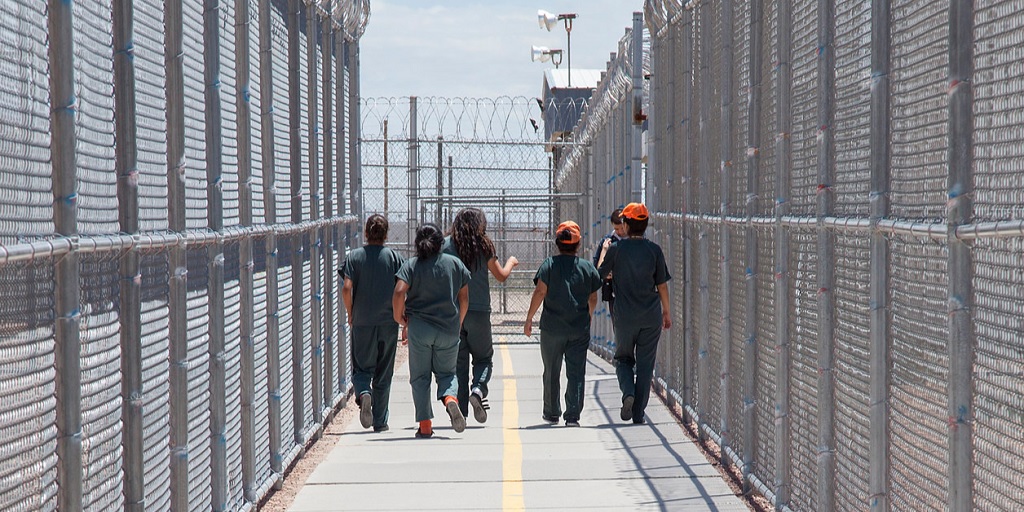State governments are leading the way on eliminating a blemish from their communities—immigration detention centers.
As some state governments begin their legislative sessions, bills attempting to ban certain immigration detention centers have been introduced in multiple states. Following the lead of states like New Jersey and Illinois, New Mexico and Colorado have bills pending that would drastically decrease immigration detention, with the hope that this would lead to an end of immigrant detention altogether in their states.
Ending immigrant detention by attacking it at the state level is a relatively new strategy by immigrant rights organizations. California was the first to enact a ban on some immigration detention centers in 2017.
Immigration detention centers are broadly divided into three categories: Contract Detention Facilities (CDFs), those based on Inter-Governmental Service Agreements (IGSAs), and Service Processing Centers (SPCs).
Most immigration detention centers and the vast majority of bed space are in facilities governed by IGSAs. An IGSA is a contract between the federal government and a local or state government to use local government-owned facilities. They also sometimes contract for the use of local law enforcement personnel to operate the facilities, such as sheriff’s departments. CDFs are facilities where ICE contracts with a private entity such as CoreCIVIC or GEOGroup who own the detention facilities themselves. Finally, SPCs, which are the least common, are facilities owned and operated directly by U.S. Immigration and Customs Enforcement (ICE).
Colorado and New Mexico are targeting IGSAs. The states are introducing bills that will prohibit local governments from entering into contracts with ICE to operate immigration detention centers. The bills would also instruct those local governments to not renew current contracts when they end. Additionally, to avoid local governments circumventing this, the proposed laws also prohibit local governments from selling their facilities to ICE or private corporations like CoreCIVIC and GEOGroup. This would curtail the possibility of turning those facilities into CDFs or SPCs.
The New Mexico bill states in part that: “No law enforcement agency, law enforcement official, or unit of state or local government may enter into or renew any contract, intergovernmental service agreement or any other agreement to house or detain individuals for civil immigration violations.”
This bill would immediately affect the Otero County Processing Center, a detention center in rural southern New Mexico that has been widely criticized for its inhumane conditions and lack of oversight. Otero is subject to an IGSA between Otero County and ICE. Two other detention centers in New Mexico—Cibola County Correctional Center and the Torrance County Detention Center—are on land owned by CoreCIVIC and therefore could be converted into a contract detention facility, though advocates hope that will not happen.
Similarly in Colorado, their proposed law would also prohibit state and local entities from contracting with ICE for the purposes of immigration detention, blocking new IGSAs. It also instructs local governments who have existing contracts to terminate them in accordance with the contract as soon as possible.
These bills have been carefully crafted to follow a similar law passed in Illinois. The Illinois Way Forward Act was passed in 2021, and its provisions were upheld by the 7th Circuit Court of Appeals after a challenge brought by two counties who had profited from immigrant detention for years.
This is in contrast to a 2019 California ban on private, for-profit immigration detention centers, which in 2022 was found by the 9th Circuit Court of Appeals to be unconstitutional. The California law was significantly different in that it attempted to target Contract Detention Facilities. This law was distinct from a separate law passed in 2017—the first of its kind in the United States—which banned IGSAs in California. That law still stands.
After the passage of the 2017 law, ICE’s operations in California came to rely heavily on contract facilities, which bypassed agreements with local governments restricted under the 2017 law. AB 32—the 2019 law—attempted to ban these contract facilities. The 9th Circuit ruled that California could not interfere with the federal government directly contracting with private entities.
State governments can play a critical role in reducing immigrant detention. As these proposed laws demonstrate, ICE relies heavily on local governments to maintain their immigrant detention system. While the federal government has remained obstinate on significantly reducing immigration detention, states are stepping in to evict these inhumane facilities from their communities.
FILED UNDER: Colorado, Immigration and Customs Enforcement, New Mexico


